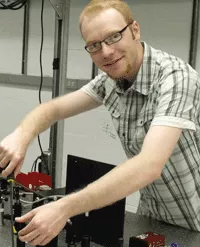Promising Pathways

Photography by Andrew Dmytrasz
While Daniel Badali has not won the Nobel Prize for science yet, he is well on his way to many accolades with his research, starting with the inaugural Abdus Salem award in 2011. This honour, which is named after the 1979 Nobel Prize winner of the same name, is awarded to the best research project done by a U of T undergraduate student and supervised by a U of T Physics faculty member.
Before coming to university, I wanted to be an optometrist,” says Badali, who has had an enduring fascination with science. “My strength has always been in math, and in my first year I developed a deep passion for it. I also took biology and physics to further increase my enthusiasm of math and science. It was the same year that Professor Claudiu Gradinaru [in the Department of Chemical & Physical Sciences] started the biophysics program, which really interested me, so I joined and helped him work out some of the kinks in the program.”
Soon afterwards Badali started working on a total internal reflection fluorescence (TIRF) microscope. The results were part of his first published paper, and Badali was delighted. “It was such a huge accomplishment for me. I was relieved and proud when I heard that it got published,” says Badali. “It was a bit humbling at the same time, knowing that it was reviewed by all these professors in the field who felt that my work and research was worthy and important enough to be shared with other professors and academics. The entire experience was just phenomenal. It took a whole year from start to finish, but it was worth it at the end knowing that my work was recognized and appreciated in the community.”
This was just the first of many papers Badali has written and will continue to write as he further explores the many different areas of biophysics. After first being published, it opened up new doors for him to work on many other research opportunities. He feels privileged to work with so many great professors and academics not only at U of T Mississauga and at U of T, but also internationally as well. “While working on one project with Professor Dwayne Miller [in the Departments of Chemistry and Physics at UofT and the Department of Physics at the University of Hamburg] in Germany, I got to meet the 2009 Nobel Prize winner for chemistry,” says Badali. “That was just a great experience for me, being able to meeta Nobel Prize winner. That is part of what I love about science, working with many different people, with different perspectives all culminating into something that will be accepted by the scientific community.”
Badali has returned to Germany and is currently working on his PhD in Hamburg. As part of his research he is analyzing various data and working on creating movies of various chemicals and their reactions. “The setup that I am using is about two meters long, where usually before people in the field would be using lasers that were about ten kilometres long,” says Badali.
The impact he would like his research to have is to one day actually win a Nobel Prize, but in more immediate terms he hopes the new drug technique he helped to develop will be able to help with cancer and leukemia treatments and enable other scientists to build on his findings. He would also gladly open the door if certain TV producers came calling. “Well, my dream job would be to go to Hollywood and be a science consultant, working on the show Mythbusters,” says Badali. But, closer to the ground, he will also be quite happy to be a professor and teach. With all the work he has done so far, it is no surprise that he won the Abdus Salem award. Although it did come as a shock to him since he was gone for six months working in Germany, he felt it was a really great honour. Much like his work in those first papers he published, he feels honoured that his work has not gone unnoticed.



